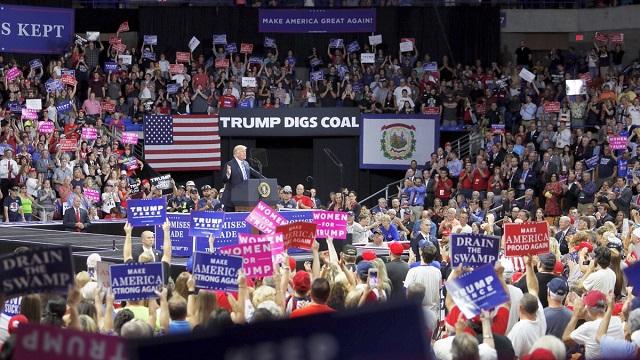
Donald Trump’s language is limited, much like his store of ideas. The US president is a demagogue who rouses without rhetoric.
A bemusing bit of Trumpworld is the small range of his rant—intense rather than deep. Much emotion, little intellect.
Last week’s column gloried in the variety of American speech. So, this time, I’ll come at Trump via the way he puts together his verbs and nouns, his notions and nostrums.
Trump’s language is boiled-down Hemingway. That’s an insult to Hemingway, but …
Behold the power Trump punches from the lip. A Trump rally speech-cum-monologue is an extended riff on his tweets—the Twitter feed rendered as conversational opera.
The president hasn’t much use for facts, because in Trumpworld a Trump word equates to a fact. His ‘voice’ in all forms is consistent. Short sentences and simple words offer his imaginings. The Donald is central. There’s always an enemy. The pushback is always emotional. And everything is big, oh so big—claims and aims become achievements as they leave those lips.
The privileged tycoon has captured his people by speaking in the most common manner. Admit the political impact of Trump speech, even if the meaning can dismay.
The trade war on China and Europe and the imbroglio with Canada show the strengths and weaknesses of the way Trump uses language. He’s having a hard time explaining the war he’s chosen, other than the usual boasting bravado. The president’s voice is all about assertion, not explanation or persuasion.
Trump started the tariff combat because, he says, the US is getting ‘a lousy deal’ and the rest of the world ‘is killing us’. Politics involves simplifying what’s complicated, and this is simple us-against-them-till-we-win stuff.
The trade war’s price effects on American life are hovering on the horizon, and it’s starting to enter conversations. Last year, Trump supporters were happy to conclude that ‘He knows what he’s doing.’ When similar chats touched the trade war this year, the equivocal thought is the hope that he knows what he’s doing.
Here’s hoping that in declaring war, Trump is after great deals; to game the system, not destroy the system. Hope that in playing trade poker he’s prepared to take a lot of money off the table and let the game go on. And worry that Trump’s zero-sum mentality may wreck a complex system. The president’s refusal to endorse judges for the World Trade Organization—disabling the dispute-settlement mechanism—strikes at the global rules and their operation.
Nihilistic vandalism is strange trade policy, although it might be good politics.
In a letter from America last October, I argued that the surging US economy and Trump’s ability to inspire his base meant he’d win a second term as president. Those factors still apply.
America is humming. The official jobless rate is down to 4%, second-quarter growth hit 4%, and the re-build from the great recession has delivered the longest bull run in market history. Parts of America that voted for Trump feel confident and are growing. Trump mightn’t be responsible for much of this, but whatever happens on a leader’s watch belongs to the leader. He’ll claim all the credit—a core Trump consistency is that it’s always all about The Donald.
However, the Trump effect is so extreme it’s clouding the usual equation for a second term. That equation reads: strong economy plus sitting president with strong party support equals re-election.
Unusual elements could unbalance the equation. Trump is a revolutionary (or just revolting). He’s made a hostile takeover of the Republican Party. Trump crashes and trashes his own party the way he crunches everything.
A year ago, it was possible to argue that Trump would deliver standard conservative policies; he wouldn’t be as bad as his language. Responsible adults would see that Trump settled down to become a conventional Republican president. Sorry, people, not happening. Or, in New Yorkese, fuhgeddaboudit! Trump is doing what he said he’d do. With gusto.
Trump is changing the Republicans, but the party has little hold on him. That’s as scary for the party as it is for everybody else.
Australia hopes that Defense Secretary James Mattis can hang on, but the idea of ‘responsible adults’ standing between Trump and whatever he wants is very last year. Trump is ripping pages out of the rulebook. How American presidents behave. How they talk to America. How they get re-elected.
Trump isn’t interested in uniting America, pitching for the centre where the traditional majority is found. As Jonah Goldberg observes: ‘Donald Trump is the first president in living memory who seems utterly contemptuous of even appearing to care about voters outside of his base in a sustained way. He often refers to “my people” as if he is president of his fan base and no one else.’
Trump doesn’t want to broaden his base, just harden it. The base will re-elect him as president, unless he so enrages a lot of other bases that they unite to overthrow him.
The fascination of America’s November mid-term elections will be the extent to which Trump’s voice energises an anti-Trump coalition to shout back at him. November’s vote is a test run of whether other American voices can combine to be louder than Trump’s.
That answering voice would sound like John McCain’s farewell statement:
We weaken our greatness when we confuse our patriotism with rivalries that have sown resentment and hatred and violence in all the corners of the globe. We weaken it when we hide behind walls rather than tear them down, when we doubt the power of our ideals rather than trust them to be the great force for change they have always been.